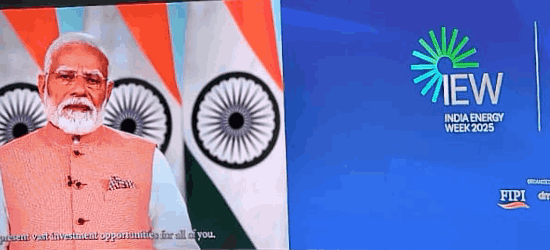Prime Minister Narendra Modi delivered his remarks at the India Energy Week 2025 via video message today. Addressing the gathering at Yashobhoomi, he emphasized that the attendees are not just part of the Energy Week, but are also integral to India’s energy ambitions. He extended a warm welcome to all participants, including distinguished guests from abroad, highlighting their crucial role in this event.
Highlighting that experts worldwide are asserting that the 21st century belongs to India, Modi remarked, “India is driving not only its growth but also the growth of the world, with the energy sector playing a significant role”. He emphasized that India’s energy ambitions are built on five pillars: harnessing resources, encouraging innovation among brilliant minds, economic strength and political stability, strategic geography making energy trade attractive and easier, and commitment to global sustainability. The Prime Minister noted that these factors are creating new opportunities in India’s energy sector.
Underlining that the next two decades are crucial for a Viksit Bharat, the Prime Minister highlighted that several significant milestones will be achieved in the next five years. He noted that many of India’s energy goals are aligned with the 2030 deadline, including the addition of 500 gigawatts of renewable energy capacity, achieving net zero carbon emissions for Indian Railways, and producing five million metric tons of green hydrogen annually. He acknowledged that these targets may seem ambitious, but the achievements of the past decade have instilled confidence that these goals will be attained.
“India has grown from the tenth largest to the fifth largest economy in the past decade”, remarked Modi. He highlighted that India’s solar energy generation capacity has increased thirty-two times in the last ten years, making it the third-largest solar power generating nation in the world. He noted that India’s non-fossil fuel energy capacity has tripled and that India is the first G20 country to achieve the goals of the Paris Agreement. The Prime Minister emphasized India’s achievements in ethanol blending, with a current rate of nineteen percent, leading to foreign exchange savings, substantial farmer revenue, and significant reductions in CO2 emissions.
He highlighted India’s goal of achieving a twenty percent ethanol mandate by October 2025. He remarked that India’s biofuels industry is ready for rapid growth, with 500 million metric tonnes of sustainable feedstock. He further noted that during India’s G20 presidency, the Global Biofuels Alliance was established and is continuously expanding, now involving 28 nations and 12 international organizations. He highlighted that this alliance is transforming waste into wealth and setting up Centers of Excellence.
Follow the link to read the full article.











